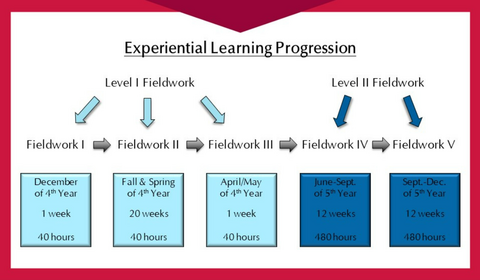Level I Fieldwork
Level I Fieldwork is integral to our program's curriculum design, as it is a key learning experience within both Clinical Reasoning courses and Psychosocial course. These experiences let students combine their classroom learning with practical experience in the field of occupational therapy. In level I fieldwork, students have the opportunity to work with individuals and populations from array of age groups, with a variety of physical, cognitive and psychosocial conditions, in a variety of settings. Level I fieldwork includes experiences in traditional and role-emerging settings. Students are provided indepth opportunities to evaluate needs, plan and implement programs, delivery of services and explore management and administrative issues in community based settings which provides services for individuals experiencing various behavioral health, psychological and/or social challenges.
Level II Fieldwork
Level II Fieldwork is a natural continuation of our curriculum in the 5th year of the program. Its primary purpose is to provide students with the opportunities to integrate the theory and skills learned in the classroom within the clinical setting. The overall goal of Level II FW is to develop the skills, attitudes, values and professionalism that enable safe, ethical, occupation-based practice and ultimately prepare students to be competent, generalist's entry-level occupational therapist.

Fieldwork Placement Process
Students will complete a Fieldwork Planning Survey in the Fall of their 3rd year to
identify their level of interest in each site setting and their geographic location
preference for each fieldwork experience. The Academic Fieldwork Coordinator (AFWC)
will then use this information to begin placing students at their Level I Fieldwork
sites. Once Level I Fieldwork sites have been assigned, students will then have the
opportunity to complete a Wish List for their Level II Fieldwork placements where
they will rank their specific site preferences.
If a student is interested in completing fieldwork at a specific site for which we
do not already have an affiliation agreement or in an area where we do not have any
affiliation agreements, they will have the opportunity to discuss their interests
with the AFWC, who will consider the quality of the site as a fieldwork placement.
Every effort is made by the AFWC to place students at sites that align with their
clinical interests, however, the quality and breadth of students’ learning is also
key to our curriculum. Therefore, students will be placed within different settings
for each of their fieldwork experiences. Below is an example of what a student’s fieldwork
assignments may look like:
| Fieldwork | Site | Setting |
|---|---|---|
| Fieldwork I | UPMC Shadyside | Inpatient Acute Care |
| Fieldwork II | Sally and Howard Levin Clubhouse | Day Programs for Adults with Intellectual/Developmental Disabilities (IDD) |
| Fieldwork III | The Children's Institute | Early Intervention |
| Fieldwork IV | Encompass Health Rehabilitation Hospital of Sewickley | Outpatient Rehabilitation |
| Fieldwork V | Pittsburgh Public Schools | School |


